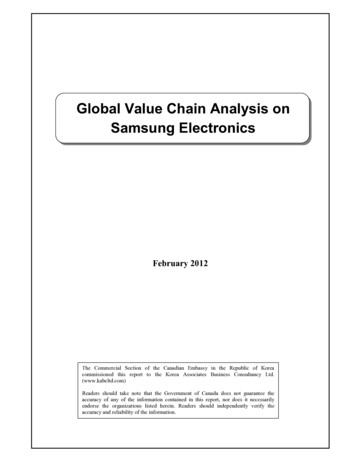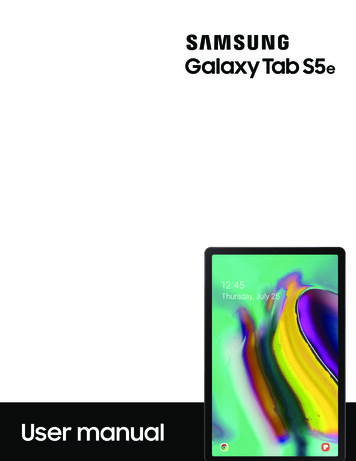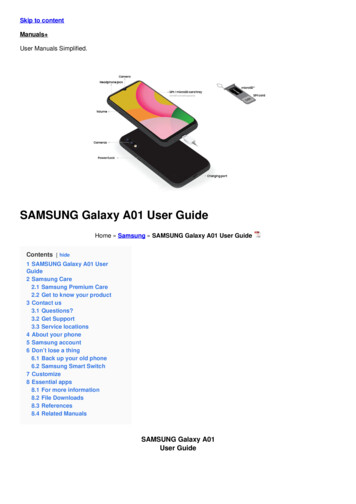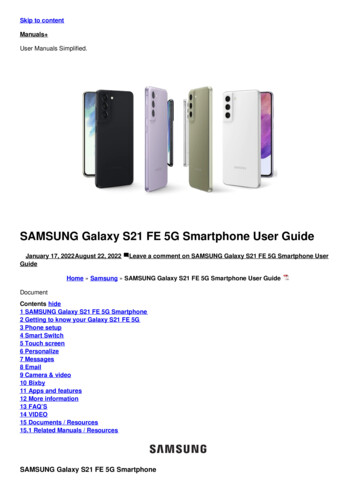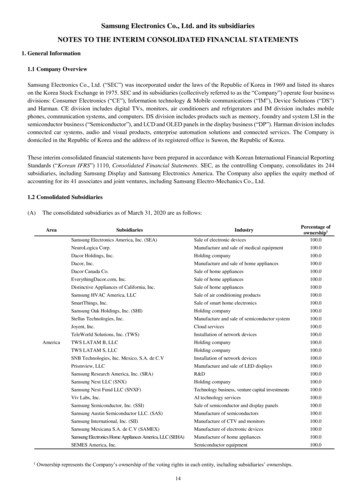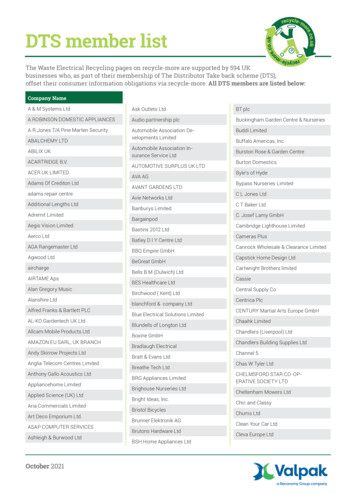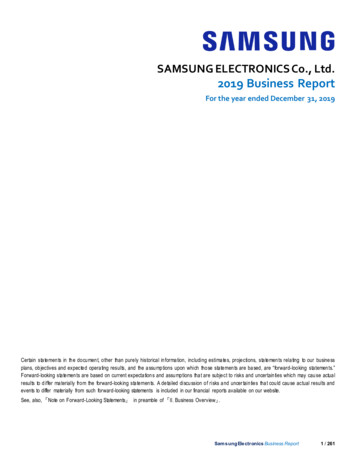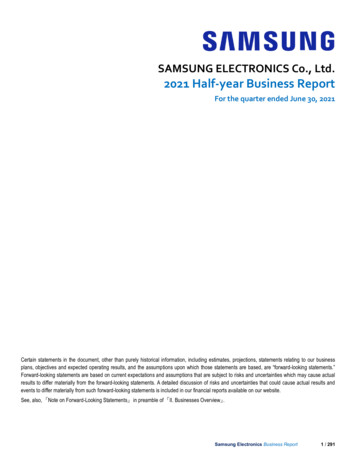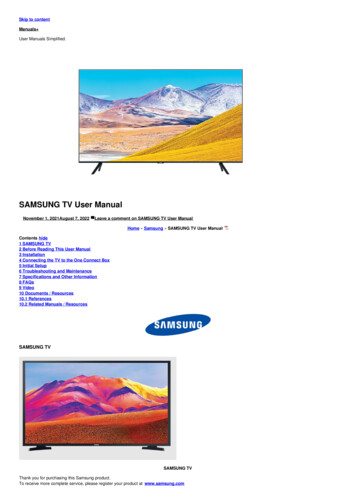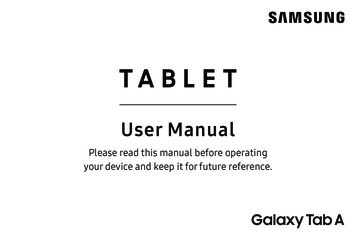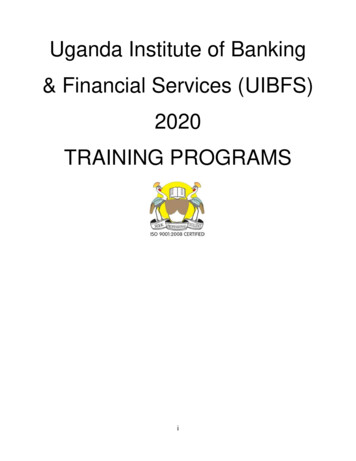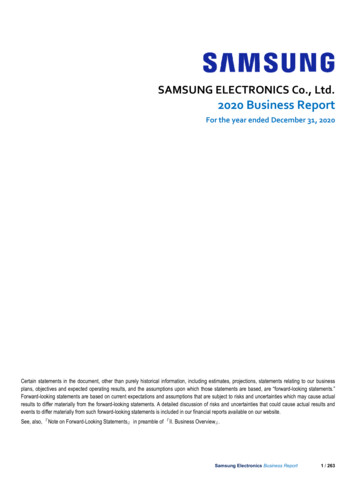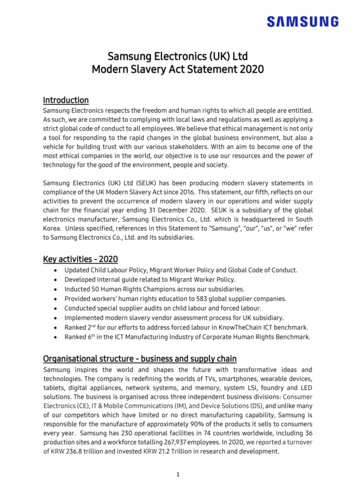
Transcription
Samsung Electronics (UK) LtdModern Slavery Act Statement 2020IntroductionSamsung Electronics respects the freedom and human rights to which all people are entitled.As such, we are committed to complying with local laws and regulations as well as applying astrict global code of conduct to all employees. We believe that ethical management is not onlya tool for responding to the rapid changes in the global business environment, but also avehicle for building trust with our various stakeholders. With an aim to become one of themost ethical companies in the world, our objective is to use our resources and the power oftechnology for the good of the environment, people and society.Samsung Electronics (UK) Ltd (SEUK) has been producing modern slavery statements incompliance of the UK Modern Slavery Act since 2016. This statement, our fifth, reflects on ouractivities to prevent the occurrence of modern slavery in our operations and wider supplychain for the financial year ending 31 December 2020. SEUK is a subsidiary of the globalelectronics manufacturer, Samsung Electronics Co., Ltd. which is headquartered in SouthKorea. Unless specified, references in this Statement to “Samsung”, “our”, “us”, or “we” referto Samsung Electronics Co., Ltd. and its subsidiaries.Key activities - 2020 Updated Child Labour Policy, Migrant Worker Policy and Global Code of Conduct.Developed internal guide related to Migrant Worker Policy.Inducted 50 Human Rights Champions across our subsidiaries.Provided workers’ human rights education to 583 global supplier companies.Conducted special supplier audits on child labour and forced labour.Implemented modern slavery vendor assessment process for UK subsidiary.Ranked 2nd for our efforts to address forced labour in KnowTheChain ICT benchmark.Ranked 6th in the ICT Manufacturing Industry of Corporate Human Rights Benchmark.Organisational structure - business and supply chainSamsung inspires the world and shapes the future with transformative ideas andtechnologies. The company is redefining the worlds of TVs, smartphones, wearable devices,tablets, digital appliances, network systems, and memory, system LSI, foundry and LEDsolutions. The business is organised across three independent business divisions: ConsumerElectronics (CE), IT & Mobile Communications (IM), and Device Solutions (DS), and unlike manyof our competitors which have limited or no direct manufacturing capability, Samsung isresponsible for the manufacture of approximately 90% of the products it sells to consumersevery year. Samsung has 230 operational facilities in 74 countries worldwide, including 36production sites and a workforce totalling 267,937 employees. In 2020, we reported a turnoverof KRW 236.8 trillion and invested KRW 21.2 Trillion in research and development.1
Samsung’s success as a global leader in the manufacture of electronic products is underpinnedby a network of 2,122 first-tier suppliers. We actively engage to support the competitivenessand sustainability of our supply chain, and provide guidance so that suppliers can operate inadherence to global laws and regulations to fulfil their social responsibilities. Our websiteincludes our Supplier List which provides details of suppliers responsible for 80% of SamsungElectronics’ transaction volume.During the financial year ending 31 December 2020, SEUK’s principal activities were: importer,distributor and lessor of electronic and electrical goods; the purchase and sale of componentsand capital equipment; the provision of research and development services to SamsungElectronics Co., Ltd.; importer and distributor of telecommunication systems; and EuropeanHead Office. These operations were UK based with the exception of a branch office in Ireland.SEUK employs approximately 1000 members of staff, the majority based at our UK andEuropean headquarters in Chertsey, Surrey. Our turnover for 2020 was 3.3bn.Human rights and labour policiesAt Samsung our human rights and labour policies are influenced by the international humanrights principles and standards set forth in the: Universal Declaration of Human Rights, theUnited Nations Guiding Principles on Business and Human Rights (UNGPs); Organization forEconomic Co-operation and Development (OECD) Guidelines for Multinational Enterprises; UNConvention on the Rights of the Child (UNCRC); International Labour Organization (ILO)Declaration on Fundamental Principles and Rights at Work; the ILO Core Conventions. As anactive member of the Responsible Business Alliance (RBA) since 2007, which was created byglobal electronics companies to improve working and environmental conditions, we abide bytheir Code of Conduct. We also ensure that we comply with the laws and regulations of thecountries where we conduct our business.In an expression of our commitment to devoting our human resources and technology tocreate superior products and services, thereby contributing to a better global society, wetranslated our five Samsung Business Principles into detailed action plan guidelines in 2005.The principles serve as the foundation for our Global Code of Conduct in compliance with legaland ethical standards and the fulfilment of Samsung’s corporate social responsibilities. Todrive sustainable growth and define our way forward, we are guided by these core values,which are instrumental to the way our employees conduct business. In 2020, we added thefollowing language to our Global Code of Conduct: “Samsung Electronics will respect therights to freedom of association and collective bargaining and action in accordance with thelocal labour laws where our worksites operate in order to maintain and develop ourcooperative labour-management relations based on mutual trust and integrity.”Samsung demands high standards of integrity from its suppliers to ensure they operate inadherence to global laws and standards to fulfil environmental and social responsibilities. OurSupplier Code of Conduct places a mandatory requirement on the supplier by Samsung tomanage their work environment risks related to human rights, environmental health and2
safety (EHS) and ethics in compliance with local regulations and global standards. Samsungsupports its suppliers with compliance to the Code through various channels.Additional global policies which demonstrate our commitment to responsible work practices,and which encompass issues relating slavery and forced labour, include our Business ConductGuidelines, Responsible Sourcing of Minerals Policy, and our Migrant Worker Policy. Thesepolicies are supported by a range of local policies where the risk of human rights and labourissue violations have been identified and which require specific mitigation measures. Thesepolicies are listed on Samsung.com, and further information on the responsible standards ofperformance and integrity we require can be found in our annual Sustainability Report.Partnerships and collaborationSince our last modern slavery statement, Samsung has worked with several civil societypartners to realign its policies to ensure workers' rights and to lay the groundwork for ourglobal human rights governance. In 2020, we amended our Child Labour Prohibition Policy,Migrant Worker Policy and our Global Code of Conduct.Child LabourIn 2014, we collaborated with The Centre for Child Rights and Business (The Centre), to createa child labour prohibition policy and a juvenile worker’s policy that would apply to our Chinesework sites. We partnered with the Centre again in 2020 to amend and integrate the policies sothat they could be extended to all of our business sites around the world, rather than onlythose in China. The policy makes it clear that we have a zero-tolerance policy for the use ofchild labour at all Samsung Electronics locations and across our entire supply chain. We alsoworked tirelessly to eliminate the use of child labour. For example, we developed theRemediation for Child Labour Guidelines in collaboration with the Centre to take correctivemeasures if a child labourer is discovered at any of our worksites.Migrant WorkersIn 2016, we collaborated with Business for Social Responsibility (BSR), a human rightsadvocacy group, to establish the Migrant Worker Policy. Since then, we've updated the policyto reflect developments in international standards relating to migrant workers, such as theconcept of migrant workers and the appropriate ranges of job commissions as specified in theRBA Code of Conduct. Furthermore, the Migrant Worker Policy's provision prohibiting forcedlabour, which was previously limited to migrant workers, was extended to all SamsungElectronics employees.To support our newly amended Migrant Worker Policy, we developed internal guidelinesproviding detailed steps towards the effective implementation of international principlesoutlined in the policy, related examples and guidelines for HR team members and managersat recruiting agencies who are responsible for hiring and handling migrant workers at ourworkplaces. Those guidelines build on leading industry recommendations such as from theRBA, BSR and Institute for Human Rights and Business (IHRB). Starting from hiring and endingwith the termination of the employment contract, the guidelines cover a total of 14 phases.3
Each phase is complemented with comprehensive guidance on identification, implementationand remediation.Human rights impact assessmentBSR’s expertise was also used to support Samsung with its first human rights impactassessment (HRIA). Undertaken in 2018 and completed in 2019, the HRIA of SamsungElectronics Vietnam (SEV) was conducted in order to seek objective information about ourbusiness impacts, and as part of a wider global effort to align our internal practices with theUnited Nations Guiding Principles on Business and Human Rights: Protect, Respect, andRemedy.The insights from the HRIA were of great value to Samsung, and action to turn learning intoimprovements were implemented. For example, during 2020, an external effectivenessassessment of the grievance resolution process at SEV was evaluated by CSR Europe. Theevaluation was based on the ‘principles of ensuring the efficacy of non-judicial grievancemechanisms’ specified in Clause 31 of the UNGPs. SEV received high evaluation scores in mostareas and was praised in particular for providing a variety of grievance reporting platformsand grievance resolution mechanisms that allow for open contact with employees and clearlydefine roles and responsibilities for grievance handling. SEV is continuing to make efforts suchas developing social networking platforms for grievance reporting, strengthening the hotlineinfrastructure, and encouraging the grievance reporting channels to encourage a moreaccessible dialogue with its employees. Samsung continues to engage with the stakeholdersinvolved in the HRIA.Modern slavery and ethical recruitmentWe have continued our engagement with the International Organization for Migration (IOM).After delivering successful training programmes with them in 2019 in Malaysia and Hungary,we planned to host similar training in Poland in 2020. Unfortunately, the training waspostponed due to COVID-19 and instead took place in May 2021. The two-day workshop underthe theme of Modern Slavery and Ethical Recruitment, which was part of our ongoing effort toreduce the risk of forced labour in businesses and supply chains, welcomed approximately 50participants from Samsung Electronics Poland, local suppliers, and business partners inPoland.Responsible mineralsSamsung continues to invest in multi-stakeholder initiatives to support the use of responsibleminerals. In 2019, we launched a project focused on sustainable cobalt mining, Cobalt forDevelopment, in cooperation with German International Cooperation Corporation (GIZ),Samsung SDI, BMW Group, and BASF in order to contribute to resolving the human rights andenvironmental issues arising from cobalt mining in the Democratic Republic of Congo. Ourgoal in this project was to improve the work environment and the living conditions of thesurrounding communities impacted by regional mining. In 2020, Volkswagen joined as a newpartner in the project, and together we opened a school for local children and have reachedover 2,000 residents with our agricultural and financial education workshops.4
Samsung works to source minerals responsibly and minimise the negative social andenvironmental impacts in mineral sourcing, through our work with global stakeholders andparticipation in global organisations such as the RMI (Responsible Minerals Initiative) andEPRM (European Partnership for Responsible Minerals). All suppliers that conduct businesswith Samsung comply with the requirements of our Responsible Minerals Policy, and Samsungonly uses minerals supplied by smelters that have obtained the Responsible MineralsAssurance Process (RMAP) Certification, a reliable smelter certification scheme from the RMI.In addition to committing to conflict-free minerals, we also manage the supply chain morebroadly to monitor any mineral mining that has been raised as an issue with regard to humanrights violations or environmental destruction. For example, we addressed the issue ofunderage workers in cobalt mines in the Congo, and mica mines in Madagascar and India,based on the OECD Due Diligence Guidance.Domestic engagementIn the UK, Samsung has been a longstanding member of techUK’s working group whichmonitors best practice, emerging issues and the evolving policy framework aroundresponsible business conduct, with a particular focus on human rights and environmentalsupply chain due diligence, ESG reporting, international labour laws and responsible sourcingof materials and minerals. The group consists of senior professionals from electronicmanufacturing and services companies and actively engages with government and other keystakeholders to inform policy and influence standards.Due diligence processesSamsung strongly supports the UN Guiding Principles onBusiness and Human Rights (UNGPs), which places aresponsibility on companies to undertake human rights duediligence. Based on these principles, we have established ourown framework to identify, prevent, and mitigate risksthreatening workers’ rights that may occur across ourbusiness activities. We also endeavour to ensure our partnersand first-tier suppliers undertake the same level of effort torespect their workers’ rights. First-tier suppliers are requiredto assess their own vendors based on our Supplier Code ofConduct.At Samsung we are actively reviewing and updating methods to conduct due diligence,including online audits, in order to create a sustainable and efficient due diligence frameworkin light of various social and environmental developments. This includes the changes broughtabout by the COVID-19 pandemic.Our efforts to raise due diligence standards and practices that protect workers’ rights wasrecognised in industry benchmark studies in 2020. We were ranked 2nd for our efforts toaddress forced labour in the KnowTheChain benchmark of ICT companies, and ranked 6th in theICT Manufacturing Industry of Corporate Human Rights Benchmark.5
Risk management systemsAcross our global production worksites, and our supplier’s worksites, Samsung operates anintegrated work environment management process to monitor and manage the workenvironment. The annual assessments required at our factories and at our suppliers are basedon RBA standards, which are reflected in our Business Conduct Guidelines and our SupplierCode of Conduct. This section of the statement now examines the risk management systemsat our production worksites, UK subsidiary and suppliers.Samsung worksite management systemsFor our own operations, we operate a system that identifies and monitors factors that canaffect employee labour and human rights through a range of internal and external channels.Our worksite monitoring system supports the enforcement of labour and human rights andcompliance management in areas such as working environment, workplace culture, operationof representative bodies, and management of suppliers. The system, provided in 12 languages,is instrumental in identifying worksites that need in-house expert consultation to strengthencapacity and improvements.In 2020, many production facilities were on lockdown and many countries closed their bordersto overseas travellers, posing great challenges to due diligence activities. However, weconducted RBA Validated Assessment Program (VAP) audits in five domestic sites and fouroverseas sites after carefully considering COVID-19 assessment in each country, the feasibilityof third-party assessment agency auditing, and the safety of our employees. As a result, atotal of five sites including those in Indonesia, Thailand, and China received the RBA platinumgrade by attaining the full score of 200 points, three sites acquired the gold grade, and onesite acquired the silver grade.Special worksite assessmentAfter amending our Migrant Worker Policy, Samsung developed internal complianceguidelines that provide detailed methods to comply with the policy, related case studies, andprecautions for HR team members and managers at recruiting agencies who are responsiblefor hiring and handling migrant workers at our workplaces. We established the guidelines byconsulting the RBA, international organisations, and the NGOs BSR and IHRB. To assesscompliance with these guidelines we undertook audits of the four regional subsidiaries thathire migrant workers (Malaysia, Slovakia, Hungary, and Poland). All of them were found tohave followed the applicable policies and guidelines without incident. We plan to performregular audits to assess compliance with the Migrant Worker Guidelines.Corporate risk management structureWhilst efforts to manage the impacts and risks of labour and human rights are generallymanaged by local teams with the appropriate skills and competencies, oversight of Samsung’srisk management systems on human rights and labour issues rests with our Global LabourIssues (GLI) Committee. The GLI Committee, which convenes bi-weekly to discuss labour andhuman rights issues, consists of executives and working-level employees from six functions(Human Resources Team, Investor Relations Team, Legal Office, Partner Collaboration Centre,Corporate Sustainability Centre, Global EHS Team). Any important matters that require6
measures and actions to take are escalated to the Sustainability Council, which consists of keyexecutives, and then reported to top management.Managing the working environment of our suppliersWe have developed a self-assessment tool using 85 categories based on the RBA Code ofConduct and have distributed it to all our suppliers. Using this tool, our suppliers conduct aself-assessment once a year. We encourage suppliers to obtain international certificationsrelated to the social responsibilities of companies such as SA8000, and we have incorporatedthis element as a self-assessment category.Internal supplier auditsOn-site audits of our suppliers are conducted by designated independent assessmentmanagers at Samsung. For thorough inspection of the working environment of our suppliers,we collect and examine the opinions of suppliers’ employees and identify problems that needimprovement. We record these problems in the GSRM system and suppliers draw up plans andimplement measures to improve them. We advise our suppliers to take immediate actionswherever possible, and conduct audits to determine whether necessary steps have been takenwithin three months after issues have been flagged. For matters that require significant timeand financial resources, such as facilities investment and certifications, we check the progressand monitor the improvements based on actions plans developed by the suppliers.In 2020, we conducted on-site audits on 376 suppliers considered to be of high risk. As a resultof the implementation of improvement measures, the average compliance rate recorded was95%. We consider high risk suppliers to be companies with geopolitical risks related toworkers’ rights or highly influential on such rights (i.e. suppliers that meet a specified amountof business volume and ratio in their transactions with Samsung Electronics, rank low in selfassessment, or have been mentioned in the context of work environment issues raised bystakeholders such as NGOs).Special supplier assessmentsIn addition to our on-site audit programme, we conduct special assessments of suppliers.Child Labour: We hold a zero-tolerance policy against suppliers that allow child labour, whichis why we hold an annual special audit on suppliers. Where violations are identified we requireimmediate corrective measures to be taken and will impose penalties in a comprehensiveevaluation of the supplier. In 2020, having investigated 177 suppliers, we found no evidenceof child labour; however, we requested improvement to companies that had a weak hiringprocess, such as exempting ID verification.Forced Labour: In 2019, we conducted a special investigation of forced labour claims, whereissues regarding work environments and migrant workers were raised. From January to April2020, we visited 26 local suppliers to provide customised consulting to address vulnerabilitiesand follow up on status improvement measures.Responding to stakeholder concerns relating to the Human Rights Commission’s report intoworking conditions, we reiterated the position outlined in our Supplier Code of Conduct7
(Section 1,1, Freely Chosen Employment) – Samsung prohibits its suppliers from using allforms of forced labour and requires that all employment be freely chosen. As a member ofthe RBA, Samsung conforms to the RBA Code of Conduct and its implementation methods,including enabling due diligence across the company and our suppliers. Together with RBA,we are committed to upholding the labour rights of workers in supply chains throughout theworld and take this matter very seriously. RBA assisted its members in conducting duediligence in line with international standards related to this matter. We found no evidence ofany forced labour in the production lines related to Samsung products at this point. We know,however, that the current due diligence process on human rights and forced labour may notbe perfect. Therefore, we continue to conduct due diligence and will address findings wherenecessary.External supplier auditsAlthough COVID-19 posed considerable challenges in conducting work environment audits in2020, 78 third-party audits were conducted globally. The results found that our suppliers’compliance rate in 2020 was similar to that of last year and that efforts to improve the workingenvironment were well in progress. Where violations were found during an initial third-partyaudit, we require our suppliers to provide a detailed plan for corrective measures, and followup on the status of required improvements during the closure audit. In cases whereimprovement measures on key areas of violation take a prolonged period of time, wecontinually collaborate with our suppliers to ensure that the necessary corrections are made.SEUK risk management processAs part of domestic efforts to eradicate forced labour and end modern slavery, SEUK hasdeveloped a risk assessment process to evaluate vendors within our supply chain for potentialrisks and exposure to modern slavery. The targeted approach has been devised with vendorsoperating in a sector which has a higher potential for risk being assessed. In 2018, a reportfrom the Gangmasters and Labour Abuse Authority identified 17 sectors to be the most ‘at risk’of modern slavery. These sectors typically attract temporary, low-skilled labour. The sectorsmost relevant to SEUK included: construction; manufacturing; food service; events and otherhospitality. The scope of SEUK’s risk assessment is not limited to these 17 sectors. Indeed,other factors are taken into consideration when identifying vendors such as the value of thecontract, the size of the vendor and the country in which they operate.At risk vendors are identified using the Digital E-Accounting (DeA) spreadsheet, and an onlinesearch is conducted to determine if the vendor produces a modern slavery statement. If avendor produces a statement this will be risk assessed using UK government guidance, and arisk-weighting will be allocated according to their efforts to combat modern slavery. If avendor does not, or is not required to produce a statement, they will nonetheless be contactedfor more information on their efforts surrounding human rights and modern slavery and a riskweighting assigned. To date, no non-compliance with the UK Modern Slavery Act has beenidentified. Supporting these efforts to mitigate the risk of modern slavery in our supply chainat SEUK, we have developed a system to evaluate the compliance status of new vendors withthe UK Modern Slavery Act, and to understand what processes they have in place to mitigatesuch risks.8
Measurement and performance standardsSamsung’s global grievance handling mechanism not only seeks to identify adverse humanrights impacts that the business enterprise may cause or contribute to, but also complaints,demands, and suggestions about the work environment. To achieve this, we operate variouschannels for receiving grievances and complaints depending on the characteristics of eachSamsung worksite, including the hotline call, online and offline channels, and our employees’representative bodies. For migrant workers, we provide materials about the grievanceresolution procedures in their native languages, making the grievance resolution moreaccessible and more effective.Samsung publically reports the number of worksite grievances it receives in its annualSustainability Report. In 2020, as a result of the COVID-19 pandemic, offline grievancesubmissions decreased from 43% (in 2019) to 28%; however, virtual channels such as onlinechannels and hotline calls increased. Furthermore, we saw a rise in complaints about thehealthy working climate, such as requests to increase disease prevention activities at ourworkplaces and improve the working environment to comply with the social distancingrestrictions. We are working to reduce the obstacles our workers face as a result of COVID-19,attempting to address any issues that have arisen at our workplaces and assisting them inovercoming their personal difficulties.We also support our suppliers in establishing and operating an internal grievance handlingsystem to facilitate communication between the management team and employees. As anextension of this effort, we have been operating a direct hotline since 2013 to receive reportson suppliers’ issues of work environment standards or workers’ rights to supplement the onsite audits. Reports are submitted via landline, email, or mobile phone, and posters thatprovide guidance to the hotline system in the appropriate local languages are displayed at theworkplace, including offices, hallways, manufacturing sites, dormitories, and cafeterias. Allreports go through a fact-check within a week, and we update the grievant with a plan ofimprovement and track the status of corrective measures on the part of the supplier.In 2020, the most frequent complaints reported were regarding managers and wages, whichwe swiftly addressed through appropriate training and reinforcement of communication withsuppliers. We have confirmed that improvements were made in these areas. In particular, weresolved the issue of unpaid wage claims by interviewing the departed worker and the hiringagency and paying out the correct amount owed. This confirmed the effectiveness of ourhotlines in addressing grievances, seeing that it has become a sufficiently accessible channelthrough which even retired workers could reach out to us.In addition, in order to establish a more reliable grievance handling system, we collectedopinions on the improvement of the hotline system from suppliers and conducted informantsatisfaction surveys. The results found that the identity of the grievant were protected andthat all measures were satisfactorily handled. We will continue to further improve this systemin working with suppliers.9
As reported in previous statements, Samsung conducts third-party supplier audits andmonitors and reports performance against five established indicators: labour and humanrights, health & safety, environment, ethics, and management systems. Audit results foundthat our suppliers’ compliance rate in 2020 was similar to that of last year and that efforts toimprove the working environment were well in progress.Third-party supplier audit results201820192020Total96%96%95%Labour & Human RightsHealth & SafetyEnvironmentEthicalBusiness Management %Finally, Samsung values the opinion of external stakeholders and promotes a number ofreporting channels to enable constructive dialogue on work environment standards or theinfringement of human rights at our worksites, and our suppliers’ worksites. We operate theSamsung Electronics' Global Business Ethics & Compliance system (www.sec-audit.com),corporatehotline( ociety@Samsung.com), to listen to the opinions of various external stakeholders. Wecontinually evaluate the effectiveness of our internal and external grievance procedures, andseek to improve accessibility and system design where necessary.Training and capacity buildingIn 2020, Samsung worked in collaboration with BSR to create a workers' rights training coursefor all employees. The course covered topics such as: the workers' rights that all employeesare entitled to; the value of workers' rights; the company's and employees' responsibility toensure workers' rights; and, how to protect workers' rights at work. However, depending onthe learner's job status, the course could include additional learning materials.Due to COVID-19, we concentrated on o
performance and integrity we require can be found in our annual Sustainability Report. Partnerships and collaboration. Since our last modern slavery statement, Samsung has worked with several civil society partners to realign its policies to ensure workers' rights and to lay the groundwork for our global human rights governance.
